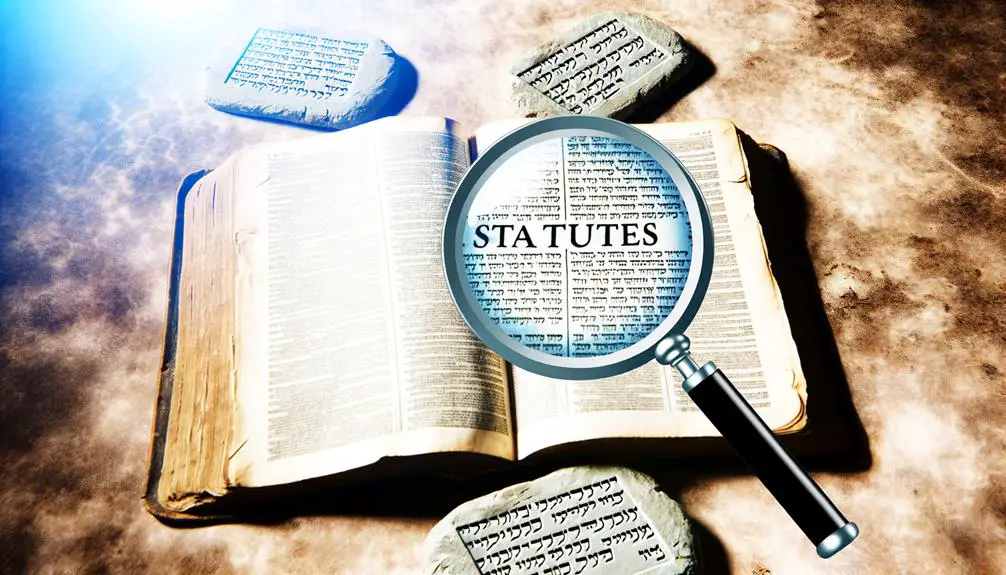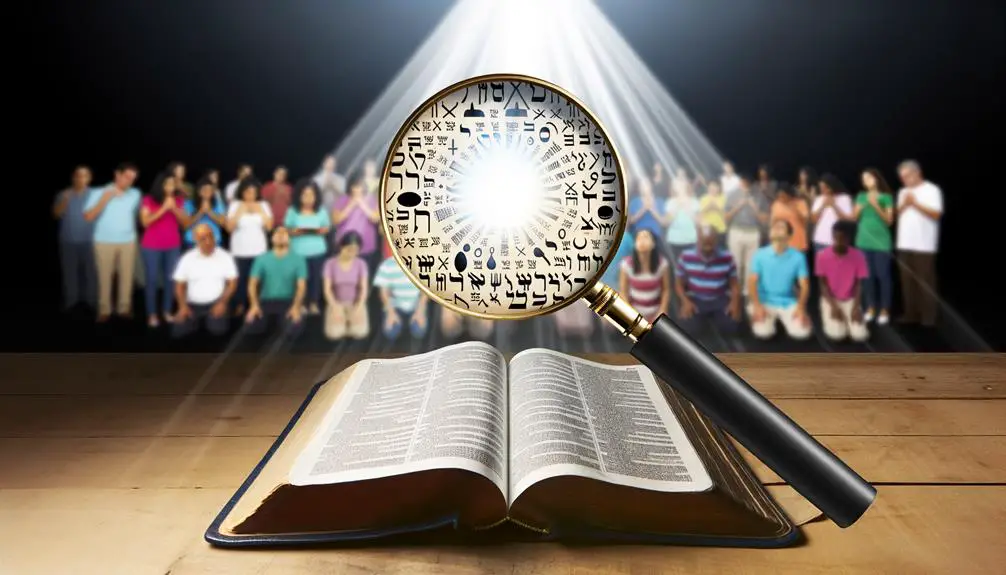Yield to the ancient statutes of the Bible, uncovering layers of divine covenant and moral guidance that resonate with eternal significance.

Statutes Meaning in the Bible
Imagine yourself wandering through an ancient desert, the sun beating down on your back, as you come across stone tablets etched with words that have shaped civilizations: the statutes of the Bible.
You've likely encountered them in passing, but have you ever stopped to consider their deeper significance? These statutes aren't just historical relics; they're part of a complex system of laws, commandments, and guidelines designed to govern not just behavior, but the very heart of a covenant relationship between the divine and the devout.
As we explore their nuances, you'll discover layers of meaning that resonate even in today's world, prompting a reevaluation of how these ancient texts influence modern faith.
Key Takeaways
- Biblical statutes are specific divine decrees that guide rituals, justice, and personal behavior.
- They play a crucial role in shaping the covenant relationship between God and His people.
- Statutes are differentiated from broader laws and direct commandments, enriching biblical interpretation.
- In modern faith, statutes' principles guide ethical behavior and nurture spiritual discipline.
Defining Biblical Statutes

To understand the profound impact of the Bible, it's essential to define what we mean by 'biblical statutes,' which are essentially the laws or decrees ordained within its texts. These statutes originate from a time when divine guidance was sought to govern personal behavior, societal norms, and religious practices. They're not merely historical artifacts; they embody the moral and ethical framework that has shaped cultures across the globe.
The origin of these statutes is deeply rooted in ancient traditions and beliefs. They were believed to be directly communicated by the divine to prophets and leaders, who then transcribed these divine laws for the people. This direct link to the divine gives the statutes an unparalleled authority in the religious and cultural interpretation of the Bible.
Cultural interpretation plays a crucial role in how these statutes are understood and applied. Different communities have interpreted the statutes in ways that align with their existing customs, values, and societal structures. This has led to a rich tapestry of biblical application, where the same statute may hold different meanings and implications across cultures. It's a testament to the dynamic and living nature of religious texts, where interpretation evolves with time and context.
Understanding these statutes, therefore, requires not just a reading of the text but an appreciation of its origins and the cultural lenses through which it's viewed. It's a journey into the heart of how sacred texts influence human thought and society, offering insights into the complex relationship between divine commandments and human interpretation.
Historical Context of Statutes

Understanding the profound impact of biblical statutes requires a look into their historical context, revealing how they've shaped and been shaped by the societies that adhere to them. These ancient rules and principles didn't exist in a vacuum; they were deeply intertwined with the cultural, social, and legal landscapes of their times. To grasp their significance fully, it's crucial to consider several key aspects:
- Cultural Influences: Biblical statutes were profoundly influenced by the surrounding cultures of the Near East. The norms, traditions, and legal practices of neighboring civilizations often found their way into the biblical legal system, albeit in a form that was compatible with the unique theological and ethical outlook of the Israelite community.
- Societal Needs: The statutes addressed the specific needs and challenges of ancient society, from property rights to personal conduct. They aimed to create a just and orderly community by establishing clear guidelines for behavior and conflict resolution.
- Legal Evolution: Over time, these statutes underwent significant evolution. As societies changed, so too did their legal requirements and moral expectations. This evolution is evident in the progression from the laws in the books of Exodus and Deuteronomy to the more refined legal discussions in the Talmud.
- Religious Significance: Beyond their social and legal functions, biblical statutes held deep religious significance. They were seen as divinely ordained, guiding the faithful in their relationship with God and with one another.
In exploring the historical context of biblical statutes, it's clear that their development and application were heavily influenced by cultural interactions, societal needs, and the ongoing process of legal evolution.
Statutes in the Covenant Relationship

Statutes play a pivotal role in shaping the covenant relationship between God and His people, setting the foundation for a profound and reciprocal bond. These divine guidelines aren't arbitrary; they're central to understanding the covenant foundations that God established with humanity. Through statutes, you're invited into a dialogue with the divine, a conversation that shapes both your individual life and the collective existence of His people.
The relationship dynamics within this covenant are complex and multi-layered. Statutes act as the terms of this sacred agreement, defining the responsibilities of each party. You're not just following rules; you're engaging in a partnership that requires mutual respect, adherence, and understanding. This isn't about blind obedience but about cultivating a relationship based on trust, love, and respect for the boundaries set by these statutes.
Moreover, these statutes serve as a constant reminder of your role in this divine partnership. They don't just dictate how you should live; they illuminate why you live in accordance with God's will. It's a relationship that transcends mere legalism, moving into the realm of heartfelt commitment to uphold the values and principles that these statutes embody.
In essence, the statutes in the Bible aren't just ancient texts to be passively accepted. They're active components of the covenant relationship, shaping and being shaped by the ongoing dialogue between you and the divine. Through adherence to these statutes, you're not just following orders; you're actively participating in the continuation and strengthening of a covenant that's built on the solid foundations of faith, obedience, and mutual respect.
Differentiating Statutes, Laws, and Commandments

In the context of the Bible, it's crucial to distinguish between statutes, laws, and commandments, as each serves a distinct role in guiding the faithful. Understanding these differences helps clear up terminology confusion and sheds light on cultural interpretations that have evolved over centuries.
Here are four key points to consider:
- Statutes refer to specific prescriptions or decrees made by God. They're often detailed and pertain to particular aspects of life, such as rituals, festivals, and dietary rules. Statutes are seen as direct instructions from God, designed to set apart His people and guide them in living a life that honors Him.
- Laws, in the biblical sense, encompass a broader scope. They include the Ten Commandments but also extend to the entire body of legal and moral guidelines provided through Moses. Laws serve as the foundation of ethical and moral conduct, offering a framework for justice, social order, and personal behavior.
- Commandments are direct orders from God. The Ten Commandments are the most renowned example, embodying fundamental principles for worship and human interaction. While all commandments are laws, not all laws are commandments. Commandments carry a sense of immediacy and importance, emphasizing the relationship between God and His people.
- Understanding these distinctions is important for interpreting biblical texts accurately. It prevents the oversimplification of divine instructions and respects the complexity of cultural interpretations that have shaped religious practices over millennia.
Grasping the nuances between statutes, laws, and commandments enriches one's understanding of biblical teachings and their application in today's world.
The Purpose of Divine Statutes

Having explored the distinctions among biblical statutes, laws, and commandments, we now turn our attention to the specific purposes these divine statutes serve in guiding the faithful towards a life of holiness and devotion. At its core, divine guidance through these statutes isn't merely about setting rules for behavior; it's an invitation into a deeper, more intimate relationship with the divine. You're called to understand the heart of God and what He values, moving beyond mere obedience to a place of genuine spiritual discipline and growth.
The purpose of divine statutes goes beyond the surface level of do's and don'ts. It's about shaping character, forging a community that reflects divine principles, and nurturing a sense of belonging and identity among the faithful. These statutes act as a mirror, reflecting what's in one's heart, and as a compass, guiding one towards righteousness and away from the pitfalls and temptations that lead to spiritual decay.
Moreover, divine guidance through these statutes instills a sense of spiritual discipline. This isn't about punishment or restriction but about freedom – the freedom to live a life that's in harmony with divine principles. It's about learning to discern what's good and right and choosing to walk in that path, even when it's challenging. Through this process, you're not just following rules; you're cultivating virtues like patience, humility, and love.
In essence, the purpose of divine statutes is to guide, shape, and refine you. It's a divine blueprint for living a life that's rich in spiritual discipline and ripe for divine encounters, ultimately leading you towards a life of holiness and devotion.
Examples of Statutes in Scripture

Numerous examples throughout the Bible vividly illustrate how divine statutes were designed to shape the lives and spiritual journeys of the faithful. These statutes encompass both ceremonial practices and moral guidelines, deeply influencing the conduct and beliefs of individuals and communities.
Let's delve into some specific examples:
- The Ten Commandments (Exodus 20:1-17): These are perhaps the most well-known set of divine statutes, offering clear moral guidelines that dictate ethical behavior and social responsibility. They cover principles like honoring one's parents, refraining from murder, adultery, theft, and bearing false witness, showcasing a universal moral code.
- Dietary Laws (Leviticus 11): This set of statutes specifies clean and unclean animals, dictating what the Israelites could and couldn't eat. These dietary laws weren't only about health but also served as ceremonial practices that set the Israelites apart from surrounding nations, reinforcing their identity as God's chosen people.
- The Festival of Passover (Exodus 12:1-28): Instituted as a remembrance of God's deliverance of the Israelites from Egypt, this statute involves specific ceremonial practices, including the sacrificing of a lamb and the smearing of its blood on doorposts to protect the Israelites from the final plague. It's a profound example of a statute combining commemoration with a tangible act of faith.
- Laws of Purification (Leviticus 15): These statutes provide detailed instructions for ceremonial cleansing after instances of bodily discharges, skin diseases, and contact with the dead. They emphasize the importance of purity and the separation between the holy and the common, guiding the faithful in maintaining spiritual cleanliness.
Relevance of Statutes Today

While these ancient statutes might seem distant from our modern lives, their underlying principles continue to hold significant relevance for contemporary spiritual and ethical practices. You'll find that, through cultural adaptation and moral evolution, the essence of these statutes can guide your behavior and decision-making in ways that align with today's societal values.
Consider the process of cultural adaptation. It's about taking the core teachings of these statutes and applying them within the context of our current environment. This doesn't mean a direct translation of ancient laws into modern-day rules. Instead, it's about understanding the spirit of these laws and modifying their application to fit contemporary life. For instance, principles of fairness, justice, and compassion remain central to how we interact with others, even if the specifics of how we enact these principles have evolved.
Moreover, moral evolution plays a crucial role in how we interpret these statutes today. As society progresses, our understanding of what's ethically right or wrong evolves. The moral guidance provided by biblical statutes, when viewed through the lens of current ethical standards, can still offer profound insights into how to live a righteous life. For example, the emphasis on caring for the less fortunate and advocating for justice resonates with modern movements towards social equity and human rights.
In essence, the relevance of biblical statutes today lies not in their literal application but in their capacity to inspire and guide us through the complexities of modern moral and ethical dilemmas. Through cultural adaptation and moral evolution, these ancient teachings continue to provide a foundation for leading a life that honors both spiritual and ethical principles.
Interpreting Statutes in Modern Faith

In modern faith practices, interpreting biblical statutes requires a nuanced understanding that bridges ancient wisdom with contemporary ethical frameworks. As you navigate this complex terrain, it's important to consider how these age-old statutes can be applied in the context of today's multifaceted world. Here are four key aspects to keep in mind:
- Historical Context: Understand the historical and cultural background of each statute. This knowledge is crucial for discerning the core principles behind the texts and how they can inform your faith application today.
- Core Principles: Identify the timeless truths within the statutes. Despite the vast differences between the ancient world and today's society, the core moral and ethical teachings can still guide contemporary challenges.
- Community Interpretation: Engage with a community of faith in the interpretation process. Collective wisdom can offer diverse perspectives and insights, enriching your understanding and application of biblical statutes.
- Practical Application: Reflect on how these statutes can address contemporary challenges. This involves a creative and thoughtful process of translating ancient mandates into actionable guidance that resonates with modern life scenarios.
As you delve into this endeavor, remember that interpreting biblical statutes in the context of modern faith isn't about enforcing outdated norms but about seeking the enduring wisdom they hold. It's a journey that requires patience, humility, and a commitment to growth. By embracing this approach, you can navigate contemporary challenges with a foundation rooted in ancient wisdom, enriching your faith journey and contributing to a more ethical and compassionate world.
Frequently Asked Questions
How Do Different Christian Denominations Vary in Their Application and Emphasis on Biblical Statutes in Contemporary Worship and Practice?
You'll find that different Christian denominations exhibit a range of liturgical variations and denominational interpretations in their worship and practice. This diversity stems from how each tradition understands and applies biblical teachings.
While some lean towards a more literal application, emphasizing traditional statutes, others may adopt a more contemporary approach, focusing on the spirit rather than the letter of the law. This results in a rich tapestry of practices across Christian communities.
Are There Any Biblical Statutes That Have Been Significantly Reinterpreted Over Time Due to Cultural or Societal Changes, and How Has This Affected Their Application in Modern Faith Communities?
Absolutely, several biblical statutes have seen significant reinterpretation due to cultural shifts and deeper understanding of historical context. This evolution, often influenced by translation nuances, has impacted their application within modern faith communities.
For instance, views on issues like slavery and gender roles have evolved, showing how interpretation can shift with societal values. This demonstrates the dynamic relationship between scripture, its interpretation, and the ever-changing societal norms.
Can Biblical Statutes Conflict With Modern Laws, and How Do Faith Communities Navigate Such Conflicts While Remaining Faithful to Their Religious Teachings?
When modern laws clash with religious beliefs, faith communities often rely on legal adaptability and community dialogue to navigate these conflicts.
They work to balance staying true to their teachings while respecting contemporary legal frameworks. Through discussions and reinterpretations, they aim to find middle ground, ensuring their practices are both legally compliant and spiritually meaningful.
This approach allows them to maintain their faith in a rapidly evolving societal landscape.
How Do Biblical Statutes Compare With Similar Concepts in Other Major World Religions, and What Can These Comparisons Tell Us About the Universal Aspects of Religious Law and Morality?
Ironically, you'd think all religious laws would clash, but a comparative analysis reveals surprising harmony. When you dive into how biblical statutes stack up against those in other major religions, it's fascinating to uncover the universal aspects of religious law and morality.
This exploration sheds light on the core values that many faiths hold dear, showcasing a shared commitment to guiding principles that transcend cultural and religious boundaries, offering a glimpse into universal morality.
What Role Do Biblical Statutes Play in Personal Spiritual Development and Ethical Decision-Making Outside of Communal Worship or Religious Observance?
In exploring how statutes influence your spiritual growth and ethical choices beyond group rituals, you'll find they're pivotal. They offer moral guidance, shaping your decisions and actions.
Engaging in personal reflection, you'll see how these principles guide you towards integrity and compassion in daily life. They're not just rules but a compass for navigating life's complexities, encouraging a deeper understanding of your beliefs and how they translate into everyday conduct.
Conclusion
In conclusion, understanding biblical statutes isn't just about delving into ancient texts; it's about connecting with the divine intentions behind those statutes. Isn't it fascinating how these ancient guidelines still resonate in today's faith practices?
By differentiating statutes from laws and commandments, we uncover the nuanced purpose they serve in guiding moral and spiritual life. They're not mere historical artifacts but living words that continue to shape our relationship with the divine.
Embracing their relevance today enriches our spiritual journey.



Sign up